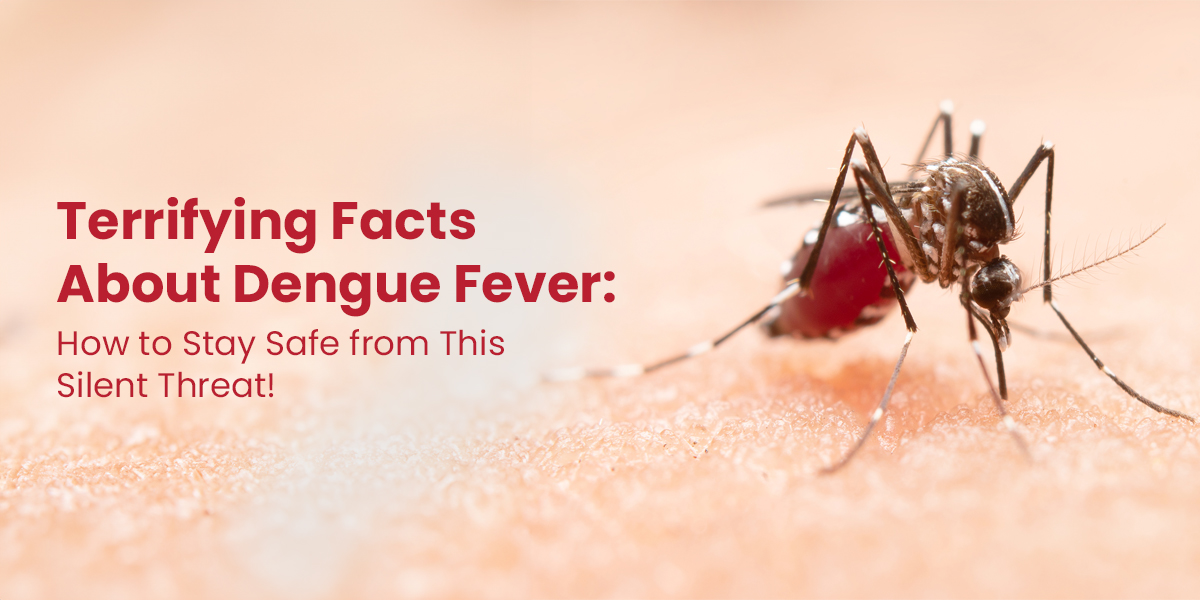Dengue Fever: Causes, Symptoms, Treatment and Prevention

What Is Dengue Fever?
Dengue fever is a viral infection transmitted to humans through the bite of infected mosquitoes, especially in tropical and subtropical regions. While many people may show no symptoms at first, others experience high fever, intense headaches, muscle and joint pain, skin rashes and fatigue. These dengue fever symptoms usually appear within four to ten days after the bite and can last for up to two weeks.
In some cases, the condition becomes severe and may lead to internal bleeding, organ damage or even death. Recognising the early sign of dengue fever and seeking timely medical care is essential for a safe recovery.
Dengue Fever Causes
Dengue fever is caused by the dengue virus, which is transmitted by the bite of an infected Aedes aegypti mosquito. When this mosquito bites a person already infected with the virus, it becomes a carrier. Later, when it bites a healthy person, it passes the virus into their bloodstream.
Once inside the body, the virus multiplies and begins to affect the immune system. This can reduce blood platelet levels and lead to serious complications if not managed in time.
How Does Dengue Spread?
The dengue virus spreads through the bite of female Aedes mosquitoes, which are also responsible for spreading other illnesses like Zika and Chikungunya. These mosquitoes are most active during early morning and late afternoon.
Dengue is not spread directly from one person to another. However, a pregnant woman infected with dengue can transmit the virus to her unborn child during pregnancy or childbirth.
Sign of Dengue Fever to Watch Out For
Identifying the early sign of dengue fever can help prevent serious complications. Some of the most common dengue fever symptoms include:
- Sudden high fever
- Severe headaches
- Pain behind the eyes
- Joint and muscle pain
- Nausea or vomiting
- Skin rashes that may appear a few days after the fever begins
- Fatigue and weakness
- Low platelet count in blood reports
In rare cases, dengue can progress into severe dengue, which includes internal bleeding, persistent vomiting, difficulty breathing, and drop in blood pressure. This is a medical emergency and requires immediate hospitalisation.
How to Treat Dengue Fever
There is no specific antiviral medication available for dengue fever treatments. The main focus is on relieving symptoms and supporting the body’s recovery process. Here’s how to treat dengue fever effectively:
- Get plenty of rest to allow your body to fight the virus
- Drink lots of fluids to stay hydrated and avoid dehydration
- Take acetaminophen (paracetamol) for reducing pain and fever
- Avoid aspirin or ibuprofen as they can increase the risk of bleeding
- Monitor your platelet levels with regular blood tests
- In case of severe symptoms, visit a hospital for supportive care
Always consult a doctor before taking any medication, especially if the patient is a child, elderly person, or has existing health conditions.
Preventing Dengue Fever
Prevention is the most effective way to protect yourself from dengue fever. Focus on controlling mosquito exposure and reducing breeding areas around your home.
Protect Yourself from Mosquito Bites
- Use mosquito repellents containing DEET, picaridin or lemon eucalyptus oil
- Wear long-sleeved clothing and full-length trousers when outdoors
- Use mosquito nets while sleeping, especially in dengue-prone areas
- Install window and door screens to prevent mosquito entry
- Avoid water accumulation in flower pots, buckets, coolers or containers
- Keep surroundings clean and dispose of garbage properly
Dengue Vaccine
A dengue vaccine called Dengvaxia is available in some countries. This vaccine is recommended only for individuals who have had dengue fever before. It helps protect against severe cases in the future. Doctors may recommend a blood test before vaccination to confirm prior infection. The vaccine is not suitable for people with no previous exposure to the virus.
When to See a Doctor
Seek medical help immediately if you or someone you know shows any of the following symptoms:
- Bleeding from gums or nose
- Severe abdominal pain
- Frequent vomiting
- Cold or clammy skin
- Difficulty breathing
- Fatigue that worsens rapidly
Early diagnosis and supportive treatment can prevent complications and save lives.
Conclusion
Dengue fever affects millions of people every year, especially in warmer regions. While many cases are mild, some develop into severe dengue requiring urgent care. By understanding dengue fever causes, recognising early symptoms, and knowing how to treat dengue fever, you can protect yourself and your family.
Always take preventive measures during monsoon and travel seasons. Contact the best physician in Kanpur and find solutions to your concerns. Early intervention is the key to recovery.
Also read: 10 Common Monsoon Diseases and How to Prevent Them

 Call-an-Ambulance
Call-an-Ambulance



